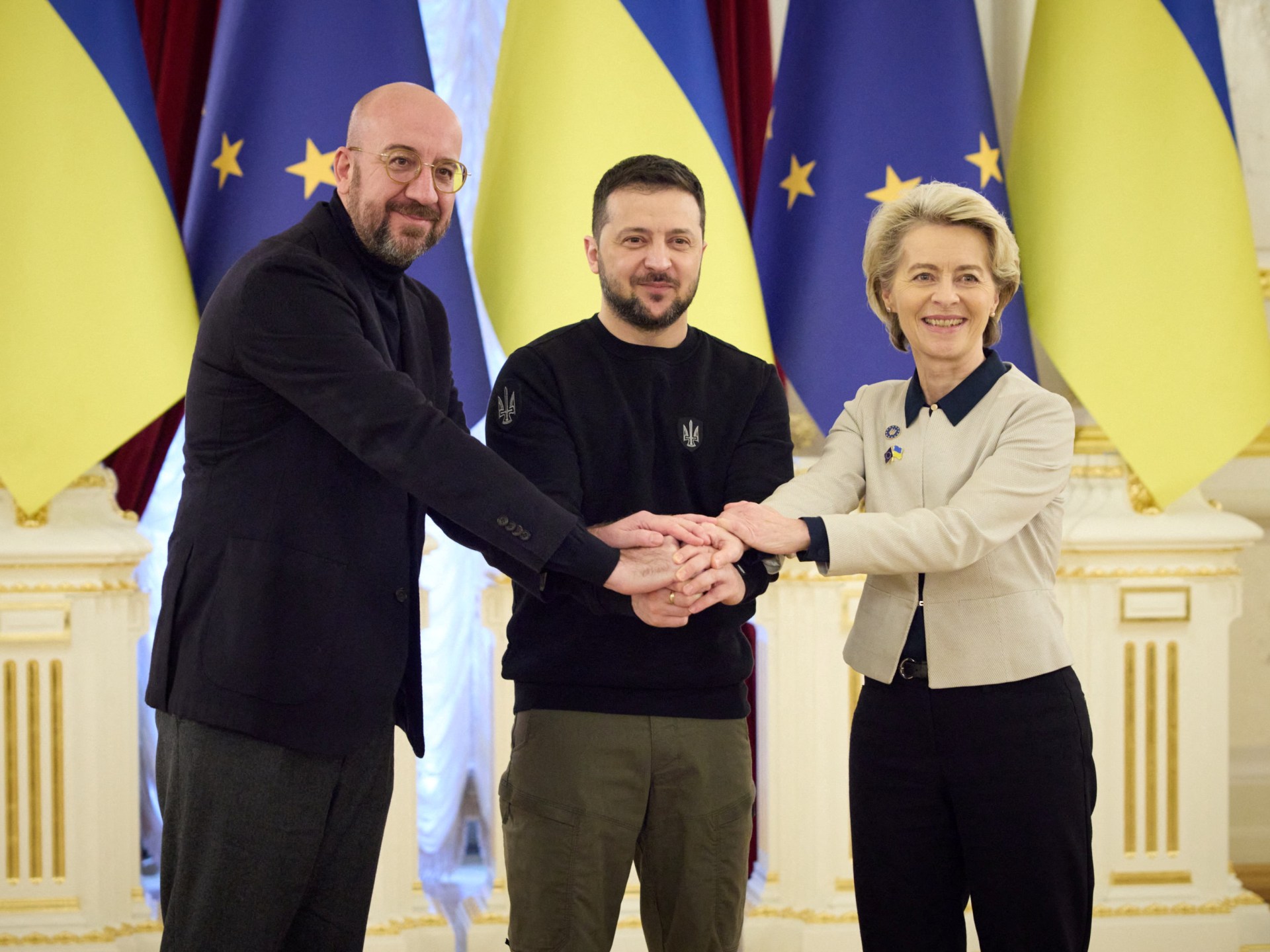The European Union reaffirmed its support for Ukraine during a summit held in Kyiv today, Friday, but said that there is no timetable for its accession to the Union. Meanwhile, Germany confirmed that it had authorized sending Leopard 1 tanks to the Ukrainian army.
European Council President Charles Michel said - at the end of the summit he and European Commission President Ursula von der Leyen held with Ukrainian President Volodymyr Zelensky - that "Ukraine is the European Union and the European Union is Ukraine."
But he made it clear that there is no timetable, and that Ukraine's accession requires a unanimous decision by the EU member states after implementing reforms.
For her part, the President of the European Commission said that the Union is about to announce the tenth package of economic sanctions against Russia.
Von der Leyen said that the summit discussed reforming Ukraine's infrastructure and enhancing energy security, and indicated that the European Union would extend the program of entering Ukrainian goods into the European Union without restrictions.
The President of the European Council and the President of the European Commission said - in a statement issued at the conclusion of the summit - that the European Union "will intensify its efforts to use the frozen Russian assets to support the reconstruction of Ukraine and pay compensation, in accordance with European and international law."
For his part, the Ukrainian president pledged that his country would not waste a single day seeking accession to the European Union, and said, "Our goal is quite clear: to start negotiations for Ukraine's accession."
With regard to military support, Zelensky said that his country needs long-range weapons because they will accelerate the resolution of the battles, he said.
German tanks
Meanwhile, a spokesman for the German government confirmed that Berlin had authorized the sending of Leopard 1 tanks to Ukraine, after it authorized the sending of Leopard 2 tanks.
"I can confirm that an export license has been issued," said spokesman Stephen Heppistreit, when asked during a press conference today about the Leopard 1 tanks, but refused to give more details.
Germany has announced that it will supply Ukraine with 14 Leopard 2 tanks from its army stocks, but some manufacturers also want to send tanks from their stocks.
Der Spiegel magazine reported that the new license includes 29 Leopard 1 tanks stored in a military factory.
Meanwhile, the Süddeutsche Zeitung reported that two factories wanted to refurbish dozens of Leopard 1 tanks to send to Ukraine, even though they had problems procuring ammunition.
Leopard 1 tanks entered service in the 1960s, predating the advanced Leopard 2 tanks widely used by armies across Europe.
Under German law, Berlin must authorize the export of tanks even when other countries that bought them want to re-export them.
This military aid comes in conjunction with the escalation of Ukrainian and Western warnings of a Russian mobilization to launch a large-scale attack on the first anniversary of the war, and Kyiv says that its estimates indicate that Russia has summoned about 500,000 reservists.
Nationalization in Crimea
Meanwhile, Russia announced the nationalization of assets and companies in Crimea - which Moscow annexed in 2014 - that part of it would be used to finance what it calls a special military operation in Ukraine.
The Crimean parliament - established by Moscow after the annexation of the peninsula - said that its deputies unanimously approved a bill on "the nationalization of the property of wealthy Ukrainians and the assets of banks and factories operating in the republic."
The speaker of the Crimean parliament, Vladimir Konstantinov, said - via Telegram - that the specific list "includes about 500 properties and assets associated with various companies and banks, as well as tourism and sports infrastructure."
The RIA Novosti and TASS news agencies stated that among the properties that were nationalized were the assets of Rinat Akhmedov, the richest man in Ukraine, the billionaire Igor Kolomoisky, the assets of about 10 banks, a number of factories and others belonging to the Dynamo Kyiv Football Club.
The total amount of nationalized property and assets was not immediately disclosed.

